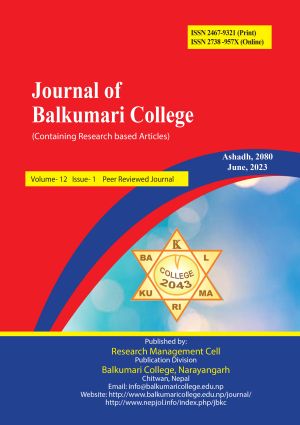Academic Procrastination’s Antecedents and their Predictability on College Students in Kathmandu Valley
DOI:
https://doi.org/10.3126/jbkc.v12i1.60418Keywords:
self-efficacy, self-regulation, self-efficacy for self-regulation and academic procrastinationAbstract
The purpose of this study is to examine the predictability of self-efficacy, self-regulation on academic procrastination of undergraduate students in Kathmandu Valley. For this, first, the undergraduate students from management program in three different districts in Kathmandu valley were taken through convenience sampling. The sample were examined by using self-report scale viz. Academic Procrastination Scale, Self-Efficacy Scale, Self-Regulation Scale and Self-efficacy for self-regulation Scale, followed by correlation and hierarchical regression under cross-sectional research design and finally, hypotheses were tested. The study found negative bivariate correlation between academic procrastination, self-efficacy, self-regulation and self-efficacy for self-regulation. Among all the the predictors, self-regulation stood the strong predictor. This study tires to provide the general understanding of procrastination in the Nepalese context, with the view to support on determining the antecedents in developing the possible intervention program for overcoming procrastinatory behavior among undergraduate students.




